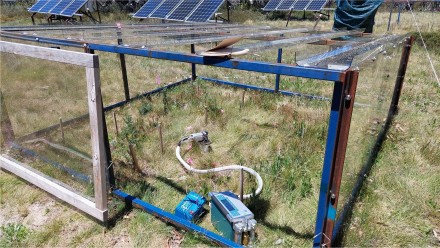Drivers of phenotypic evolution in a vulnerable alpine ecosystem
FutureClim: Responses of alpine communities to future climate change
These projects will suit students with interest and knowledge in alpine community ecology, global change biology, and ecophysiology.
Overview: Alpine regions are among the most vulnerable to climate change worldwide. Understanding the capacity for resilience and response to warming and drying conditions and more extreme events in these communities is a research priority. What is the relative importance of fundamental physiology, phenotypic plasticity, and interspecies feedbacks in determining climate change response at the community level? What is the potential for resilience and contemporary evolutionary response of species within these communities?
Project descriptions: Students will work as part of a collaborative team that aims to determine how communities of interacting alpine plants, soil invertebrates, fungi, and microbes can cope with or respond to novel climatic conditions.
Prof Adrienne Nicotra (ANU), in collaboration with a network of researchers in the Australian Mountain Research Facility (AMRF), including Prof Saul Cunningham (ANU), Prof Justin Borevitz (ANU), A/Prof Susanna Venn (Deakin), Prof Celeste Linde (ANU), A/Prof Megan Head (ANU), and Dr Pieter Arnold (ANU), are seeking enthusiastic students interested in studying ecological and evolutionary responses to climate change. The AMRF have established field sites with monitoring and climate manipulation (active heating and rain exclusion) infrastructure in the Australian Alps. This exciting project will use a combination of field monitoring and manipulation approaches to develop an understanding of alpine biotic responses to drying, warming, and extreme events.
Projects could include: 1) Combining field and controlled growth experiment to probe how variation in thermal tolerance limits and trait plasticity among plant species affect the capacity to respond to altered climatic regimes and extreme events. 2) Experimental evolution of soil invertebrates to quantify ecophysiological and life-history traits and their evolutionary responses to simulated climate change and extreme events. 3) Combining community-level vegetation surveys with monitoring of soil invertebrates, fungi, and microbial diversity using ecological genetics to explore changes and interactions between above- and below-ground communities of organisms under altered climatic conditions.
Eligibility: Suitable applicants need to be highly motivated with strong academic and research backgrounds; skills in community ecology, evolutionary ecology, ecophysiology or ecological/evolutionary genetics are required. Demonstrated ability to conduct fieldwork and independent research experience are highly desirable. Interested students must apply for admission and scholarship online at ANU. Successful applicants will receive scholarship stipend, tuition fee waiver, and research funds including computer and travel grants.
Location: We are based in the Division of Ecology & Evolution in the Research School of Biology, Australian National University, Canberra, Australia. The facilities and intellectual environment are outstanding, and the Nicotra group is a diverse, friendly, supportive, and enthusiastic group to be a part of. We strive to do excellent, fundamental research that is relevant in the context of rapid global change. Canberra is a great place to live and offers a balance of community and outdoor activities, amazing bushland and surrounds, connections to the mountains and beaches, while having the conveniences and amenities of a larger city.





